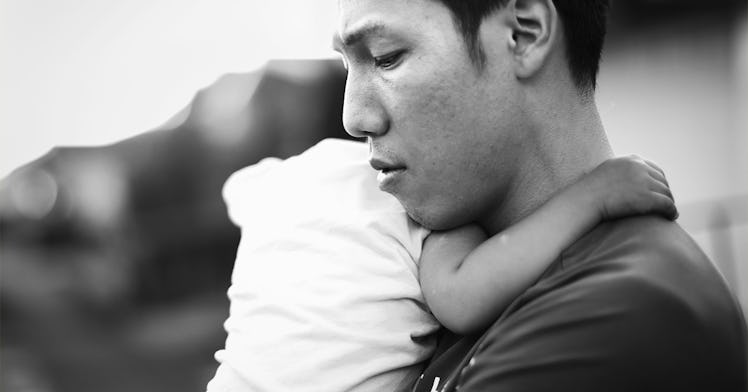Why Fathers Get Postpartum Depression And How To Fight It
You can't just walk this one off.

Bone-aching weariness. Moments of bright panic. Hours of loving gazes. A couple weeks of not wearing actual pants. As a new father, these are all things people tell you to expect. Experts also tell you to keep an eye out for postpartum depression in your partner. Rarely, however, are you told to watch out for it yourself.
But the wave of depression can strike you, too. And this fact seems like it may be a tad more important than the fact that you’ll be living in boxers and pajamas for a spell. Because the fact is that postpartum depression in men is real and should be treated with concern.
The Definition
According to studies from the National Institute of Health (NIH), postpartum depression in men, or paternal postpartum depression (PPD) affects anywhere from 4 to 25 percent of new fathers. But there’s a giant man-sized hole in the understanding of PPD. That’s because there are no common diagnostic criteria for paternal PPD.
The most common diagnostic definition is cribbed from the definition used to identify postpartum depression in women. Maternal PPD is diagnosed as a major depressive episode with an onset in the first month after birth. What’s included in a major depressive episode? Not very fun stuff:
- Inability to sleep
- Too much sleep
- Severe weight loss or gain
- Unexplained anger
- Feelings of hopelessness
- Recurrent thoughts of death or suicide
- Inability to concentrate
- Fatigue
You’re Getting Hormonal, Bro
The ladies aren’t the only one’s who have hormonal changes associated with a kid coming into the world. In fact, when your kid is born, your body sees an increase in estrogen and a dip in testosterone. If depression or anxiety already dog you, the outlook is even hairier.
Combine all this with the fact that you’re naturally worried and getting less sleep anyway and you have a recipe for a perfect storm. But not the cool kind that George Clooney and Mark Wahlberg can take on.
Two Of A Kind
One of the more troubling things about PPD is that the probability increases when a father’s partner is also experiencing postpartum depression. In one study, having a partner experiencing postpartum depression increased the likelihood of PPD in fathers by as much as 2.5 times. That makes it even more important to watch yourself for signs of PPD if your partner is also experiencing significant depression.
PPD And Your Kid
Where maternal and paternal PPD differs is largely in how it can affect your kid. That’s because mothers and fathers have different roles to play in childhood development.
PPD does change the way you interact with your kid. In some instances, you just might check-out from family life. Studies have shown that a lack of interaction between dad and kid increases the likelihood of behavioral issues in children later in life. That’s true even if you’re physically “there” for your kid.
On a similar theme, researchers suggest that PPD in fathers could decrease the amount dads read to their kids. This has a tremendous chilling effect on language acquisition. One study showed that fathers with PPD had children that used fewer words at 24 months.
What To Do
Look, you’re a dude. And your natural inclination is going to be to clam up and grit your teeth until something inside of you breaks. Don’t do that. This is not something you can walk off and soothe with a beer. You are not Indiana Jones resting on a rusty boat after Nazis dragged you under a truck. Even if that’s how you feel.
If you want to be a good father, you need to take care of your shit. There are a couple ways to do this:
Talk Therapy
Many dudes have discovered therapy works wonders. Sometimes just getting this crap off your chest, or crying it out in a safe place, is all you need to gain a new perspective. If it embarrasses you, tell people you’re going to the bar. (Actually, that’s a bad idea.)
Treat It Like New Year’s Day
You know how you make resolutions to treat your body better at the beginning of the year? Guess what? The birth of your kid is another new beginning that creates a perfect opportunity to take care of yourself. Eat better. Take a walk. Do some bro’ga. Work over a heavy bag (or if you have a cousin named Pauly, a side of beef).
Medicate
This doesn’t mean self-medicate. You don’t want to throw alcohol or drugs on a smoldering fire of depression. You want actual medication, prescribed by an actual doctor that you actually talked to. Not your weed connection “Dr.” Johnny.
Find Other PPD Dudes
The biggest internet source for information on PPD is postpartummen.com. There you’ll find a forum to get in touch with other dudes in your situation as well as articles and advice. It’s a good place to start.
You experienced excitement (and maybe some nerves) about becoming a dad while your partner grew your kid. And you probably had every intention of being the best dad you possibly could. Having PPD does not make you a bad father. And you shouldn’t think that it does. But dealing with PPD before it gets out of hand makes you and exceptionally good one.